Banned Books Week 2023
- Eleka

- Oct 5, 2023
- 8 min read

What is Banned Books Week?
Banned Books Week is a celebration of your freedom to read by libraries. It also aims to bring awareness of the dangers of censorship and book banning.
A Book Challenge is a request for a book to be removed from a library or request for it to be placed in a new location.
A Book Ban is the forcible removal of individual books or topics to prevent people from accessing information.

Who Challenges Books to be Banned & Why?
Parents initiate most book bans, followed by other library users. In previous years, school libraries saw the most requests to remove an item from a library’s collection. In 2022, a record number of bans and challenges took place in public libraries. During the previous year, 37% of challenges took place in public libraries, but this year 48% took place in public libraries.

Challenges to books can come from a parent or community member trying to shield other people's children from accessing certain books. We believe it is a parent's right to decide what their children read, and it is not up to librarians to enforce censorship.
Some of the most well-known classics like To Kill a Mockingbird, The Catcher in the Rye, I know Why the Caged Bird Sings, The Adventures of Huckleberry Finn, and The Diary of a Young Girl are among those that have been banned before. More frequently today books target contemporary stories which you can see below.
Reasoning varies for why books are banned. Some people may want a book removed because they believe certain books go against their religion or because they feature BIPOC characters, teach critical race theory, have LGBTQ characters, talk about gender and sexuality, or have violence depicted. They believe the public should be barred from accessing these stories and information.
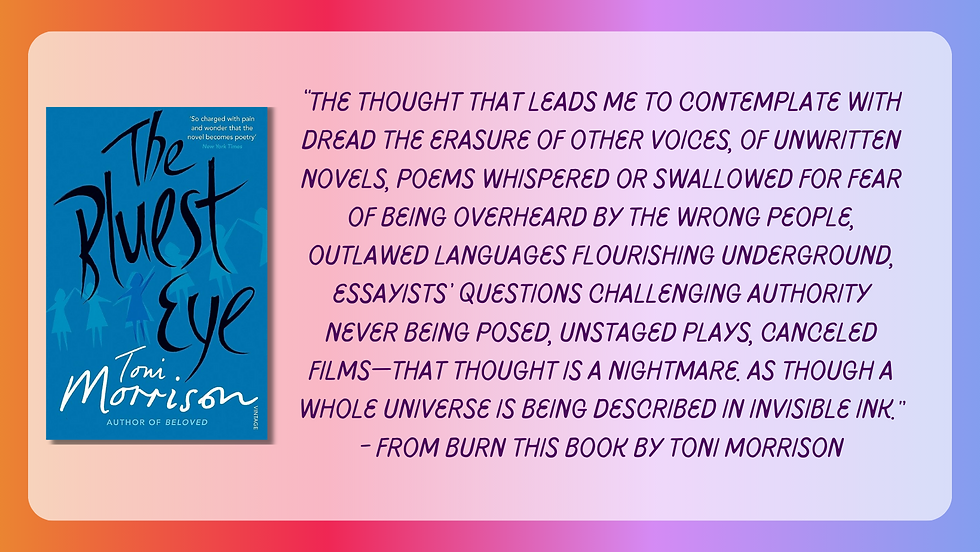
Why is Freedom from Censorship important?
It is a library’s responsibility to provide materials on a variety of subjects and by many different individuals. Public libraries are for everyone in the community, not just children, and they house books for everyone in the community. Although different people have different reading interests and information needs, libraries seek to provide relevant, inclusive, community-centered materials.
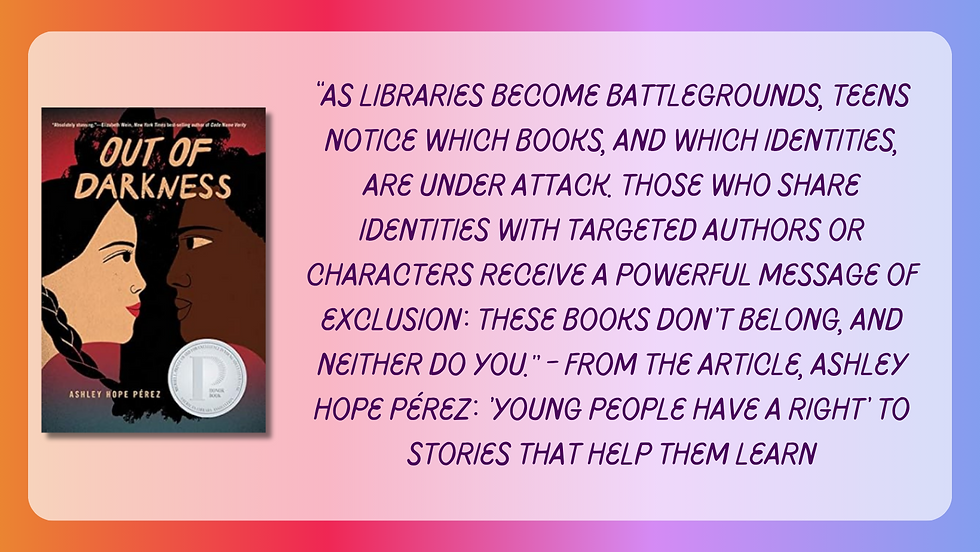
Without protections offered by freedom of speech, censorship can lead to further oppression. Some books may make people uncomfortable. Maybe they discuss heavy topics like racism, oppression, or assault. That does not make these experiences less real. Not every book is for every person. Not every book is for every child. But some people, children included, do need access to tough topics because they or someone they love is living through that same experience. Connecting through books can make people feel less alone in their struggles and embolden them to seek help if they need it.
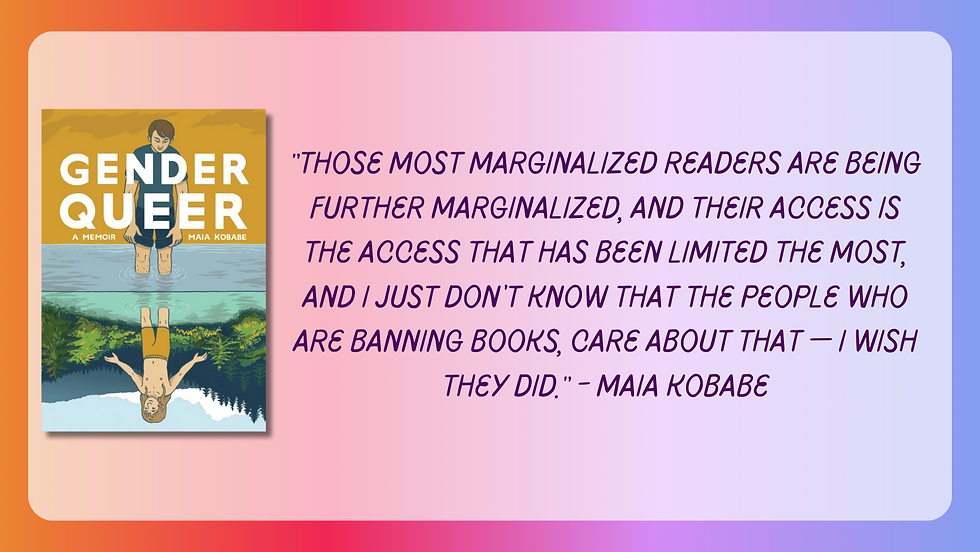
What can you do to support your Freedom to Read?
Read Banned Books!
Check out books that have been challenged across the country this year. Oftentimes these books have important stories to share and may open windows to new perspectives and ideas.
Report Censorship
If you see or hear a challenge to a book taking place, you can report it to the Office of Intellectual Freedom HERE.
Support your Local Libraries
Become a library card holder, join a library board or library friends volunteer group.
Support School Libraries
School librarians curate their collection to the age group of the students that they serve. That said, students may be experiencing radically different situations from one another. Removing access to materials thought too mature can isolate these students and prevent them from getting help with anxiety, depression, abuse, and neglect. Show your support of our freedom to read at school board meetings, especially if other parents request removal of materials. You can even join a school board!
Speak Up About Censorship
If you see censorship challenges, talk about it and show your support for our freedom to read.
Encourage Others to Read Banned Books!
Suggest books that have been recently challenged to your book club or bookish friends.

Books you can read to support your Freedom to Read
Check out 2022’s Most Banned/Challenged Books! There are a few ties this year for number 5 and 10 which is why you will see some repeated numbers.
*Maia Kobabe uses Spivak pronouns (e/em/eir).
Gender Queer, a graphic novel memoire by Maia Kobabe, explores eir life growing up as a gender queer kid and eir relationship with eir gender and sexuality. This book is a great quick read for transgender, nonbinary, and gender queer teens and young adults as well as allies wanting to learn more about transgender people and the gender diverse community. Kobabe also illustrated this book, and it won an Alex Award from the American Library Association in 2020.
This series of personal essays detail George M. Johnson’s life growing up on the East Coast as a queer Black boy as he experiences toxic masculinity, bullying, first relationships, family life, boundaries, and gender identity. The sincerity and honesty of Johnson’s writing will appeal to many young adults and adults in the LGBTQ+ community and teen and adult allies looking to strengthen their ability to protect marginalized folks.

Toni Morrison’s The Bluest Eye is a brutal account of the effects of white supremacy, racism, misogyny, and cruelty as experienced by Pecola, a young Black girl. Pecola prays for blue eyes and blonde hair like the white girls who are treated so well, but instead of this wish, Pecola’s life only gets harder. As opposed to seeing through the eyes of Pecola, Morrison tells her story through the perspectives of her family members, other townspeople, two little girls who want to help, but are too young to understand. This makes the readers become onlookers to her abuses as Pecola further dissociates and slips away from herself. This book contains graphic depictions of pedophilia, rape, child rape, animal abuse, and racism, but it is a reality people do face.
Flamer is a graphic novel set in 1995 about a boy named Aiden going off to camp in between the summers of junior high and high school. As he spends time with another boy, Elias, he can't stop thinking about him. In this story, Aiden must grapple with friends, bullies, and coming to terms with his own sexuality. The title, Flamer, eludes to Aiden's self discovery, his conflict with his religious upbringing, and his newfound ability to rise above the bullies and accept himself. Flamer won a Lambda Award for LGBTQ Young Adult books in 2021.

#5 Looking for Alaska by John Green
Miles comes from a safe and consistent homelife, but he is ready for something more. When he moves to a boarding school in Culver's Creek, his whole world changes upon meeting Alaska Young, a a wild and outgoing girl who does not have it all together. Still, she fascinates Miles with her unpredictability, her whims, and her vices. After meeting her, Miles is forever changed. Looking for Alaska is a coming-of-age story that deals with trauma, grief, and change. This book won a Printz Award in 2006.
The Perks of Being a Wallflower is written in the form of letters and follows Charlie, a young teen who spends a lot of time in his own head. As he starts high school and makes friends with a group of teens much less inhibited and naive as him, he begins to live his life for himself. Along the way, the book covers heavy themes including drugs, sex, sexual assault, and abuse. This coming-of-age story resonates with teens facing tricky situations and deep emotions.
A Court of Mist and Fury is the second book following A Court of Thorns and Roses, a fantasy series that takes place in the world of the immortal beings known as Fae. Feyre, a human, has the opportunity at an immortal life among the Fae, but she is haunted by the past that brought her to this point. Now, she must navigate the dangerous world of faerie court politics, harness her newfound abilities, and face dark forces that could mean the end of her world.
Lawn Boy tells the story of a young Chicano man, Mike Muñoz, working for a landscaping crew cutting grass but all the while wanting to do something different than menial work. Despite being well-read and wanting to be ambitious, Mike struggles to make progress toward his American dream. Through this episodic novel, Mike takes a journey of self-discovery in which he learns how to make space for happiness in a less than ideal world.
Sherman Alexie’s book based on real life events follows a young teen, Arnold Junior, from the Spokane reservation experiencing growing up amidst disability, discrimination, poverty, and inequity, but all while striving to make a successful life for himself. Throughout the book comics by Ellen Forney are interspersed as Junior makes sense of his identity as he moves between worlds. In 2007, this book won the National Book Award for Young People's Literature.
In 1930’s East Texas, crossing a segregation line when you are Black or Latinx could mean a death sentence. In this town, an interracial relationship blossoms between a Black boy and Mexican-American girl. Set against the backdrop of the most deadly disaster an American school has ever seen, the book explores extreme racial tension, physical, sexual, and emotional violence, passing privilege, exploitation of women and children, and the threat of white supremacy. Out of Darkness won a Printz Award in 2016.

Crank is a verse novel that tells the story of an AP student that has pushed herself too hard to be perfect and one day gets presented with the opportunity to try crank (meth). Through this discovery of drugs, she creates an alter ego that allows her to shift into an uninhibited version of herself. Soon, she loses herself to the drug, and it becomes more and more difficult to stop. This novel takes readers through her inner thoughts and downward spiral as the monster known as crank consumes her.
Usually Greg tries to blend in and be invisible at school. He has his best friend, Earl, and doesn’t need anyone else. When his elementary school friend, Rachel, is diagnosed with Leukemia, his mom orders him to go spend time with her. Narrating the story, Greg often makes jokes at his own expense, and it becomes clear this story is no star crossed romance, or great inspiration about fleeting time, but about three kids with kid thoughts as they experience a terrible situation.
This Book is Gay addresses sexuality frankly through a collection of first-hand accounts of being gay–experiencing same-sex attraction, stereotypes, coming out, and more. This Book is Gay is your guide for primarily cisgender gay men, but it does include other perspectives. Although the book aims to encompass other identities, it primarily focuses on gay and lesbian experiences. Although this may not be your all-inclusive guide to LGBTQ+ experiences, it has much to offer young, gay, questioning, or curious young adults.
Want to see more Banned Books? Check out ALA's List of Banned Books by Year.
Check out the Library Bill of Rights to find out about how and why libraries support freedom from censorship.
Ask your librarians for more reading recommendations! Or Request a Book Bundle, a hand-picked selection of items your librarians think you would like!
You can also visit our online catalog from our website or our SHARE Mobile Library application for access to books from all 500+ libraries in our area!
By Eleka, CPLD Librarian








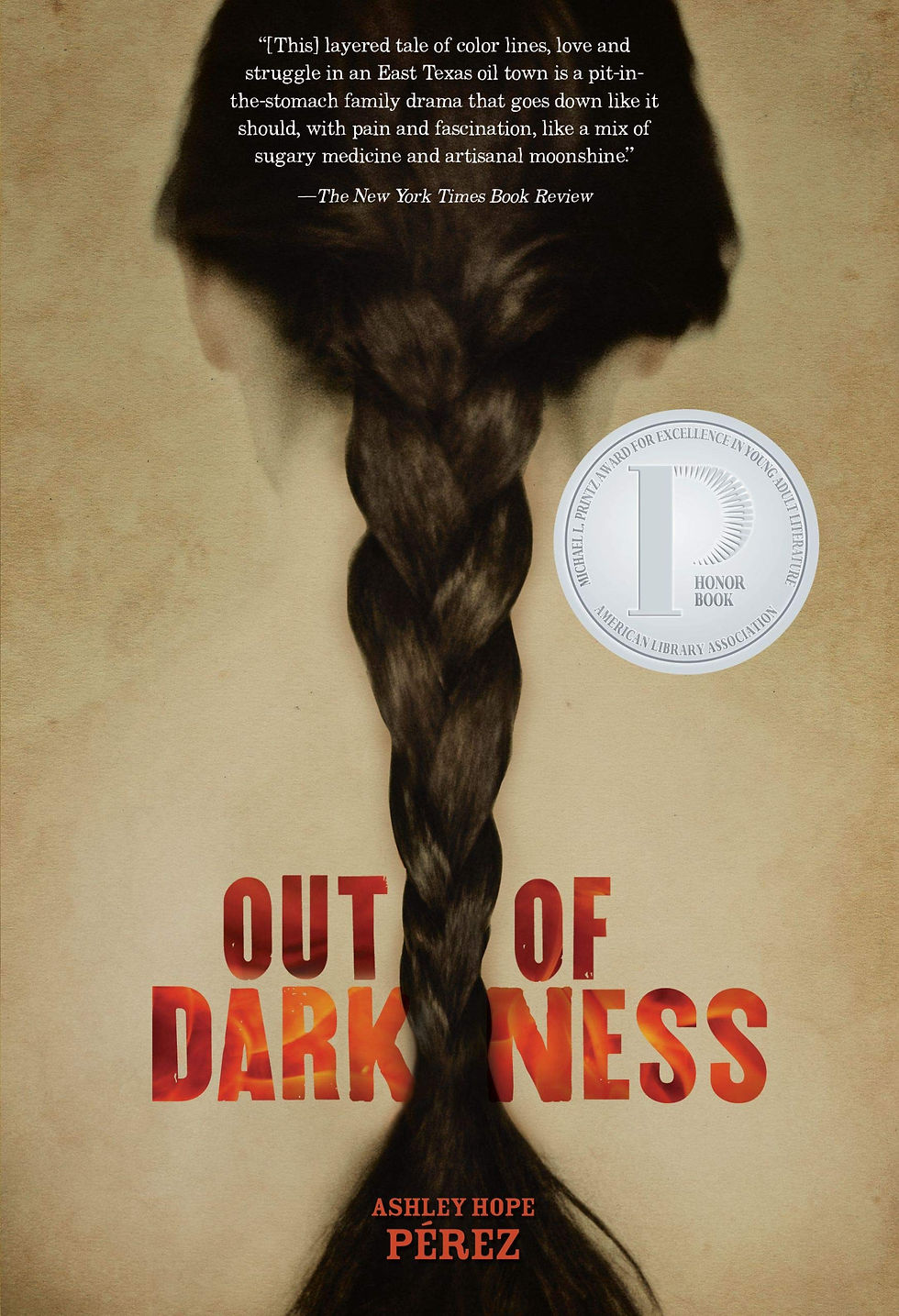

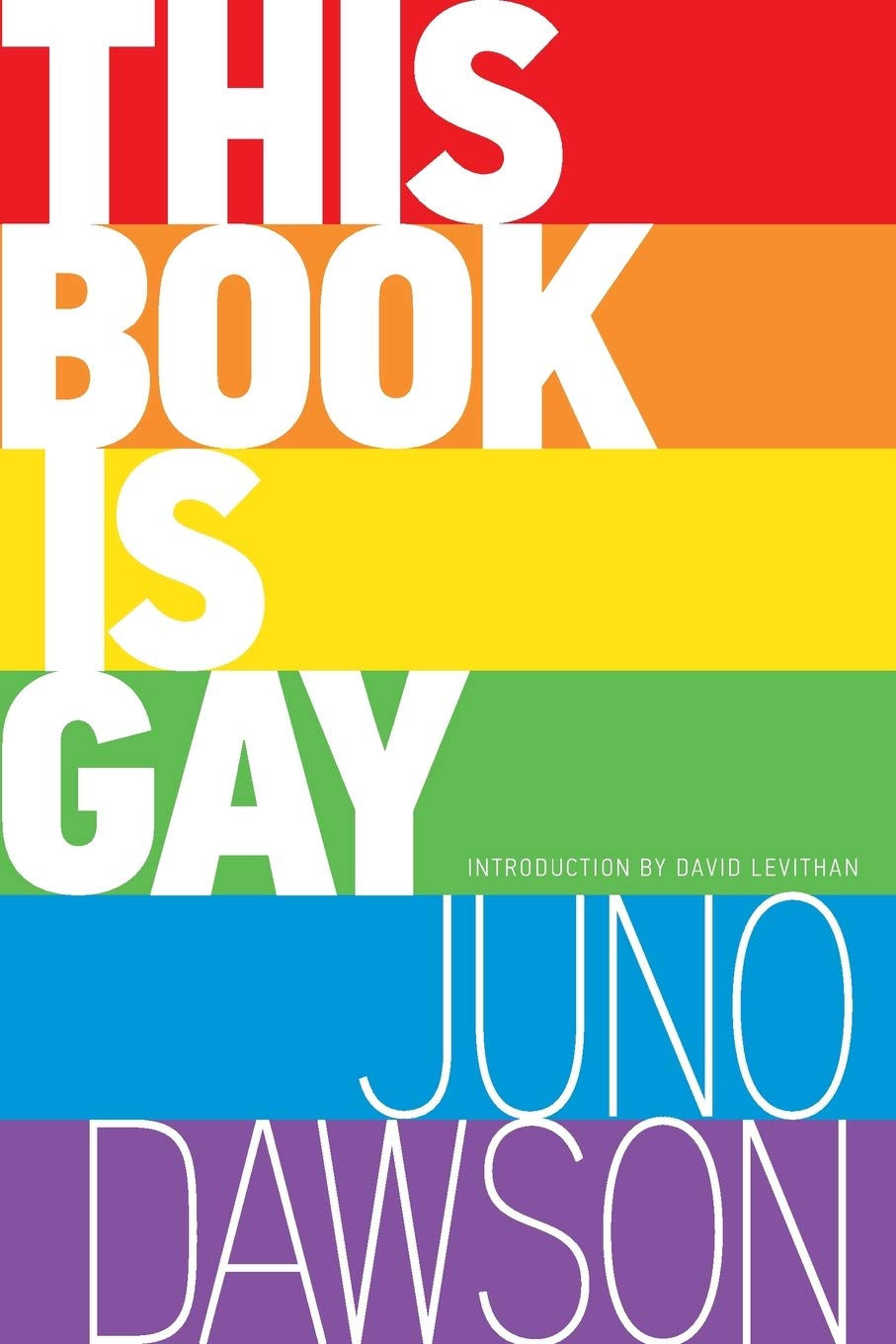



Comments